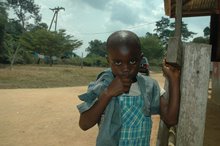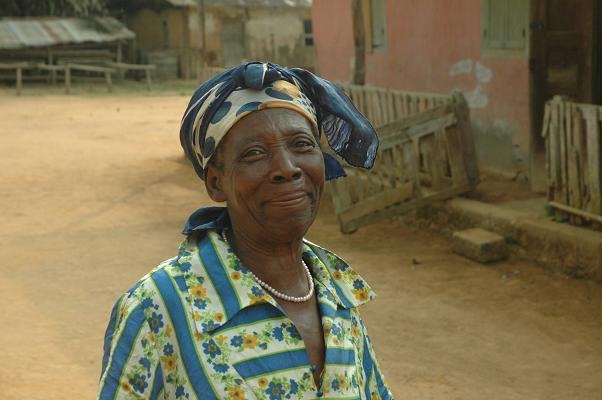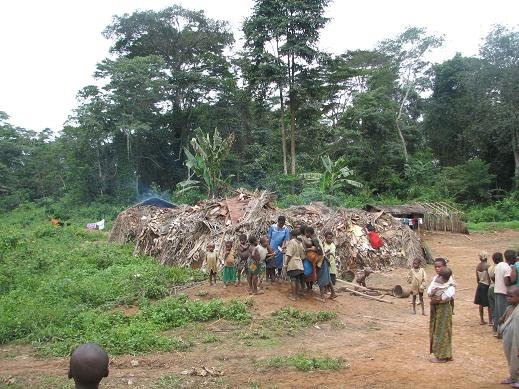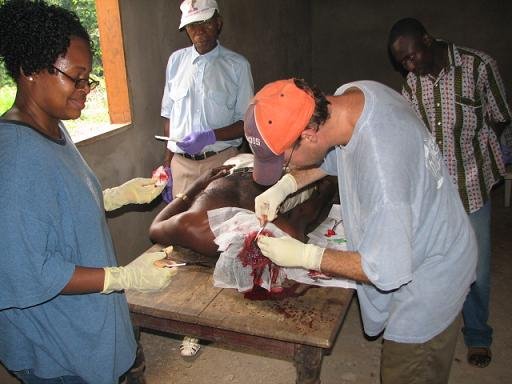
Patients waiting for their consultation

Pharmacy: Patients then queued up at the "pharmacy" which was stocked with basic drugs and vitamins purchased with contributions from the doctors, volunteers and other supporters. The pharmacy team organized the supplies pre-packaging common dosages for the most common prescriptions. Patients provide the "prescription" to a pharmacy worker who would collect the drug or drugs and use a special plastic bag to mark when the drug was to be taken. Circles or half circles underneath pictures depicting morning noon and night show the patient how many pills should be taken at what time. The drugs and prescription then go to a nurse who double checks the order, and provides any injections prescribed. The prescription is then given to the patient along with instructions on their use. Volunteers from among the villagers who are multi-lingual join the pharmacy team and convey instructions in the local dialects (Ewondo in this case) - translating from the original French or English.

Surgery patients gather around the house where two operating tables, a sterilization process and a recovery room will be set up
Surgery: On Saturday morning one of the doctors began evaluating and treating the surgical candidates who had gotten hernias from the manual labor that is central to life as a subsistence farmer, and those who had other conditions, such as benign tumors that can be safely removed during a minor procedure.

Doctor Georges Mbwelle operating a hernia on a middle-aged woman who had walked forty kilometers to get treatment that is heavily subsidized but nonetheless unaffordable to the poorest residents of Cameroon
Surgeries are conducted under difficult but sterile conditions, and extra cautions are taken (like the use of an intravenous antibiotic) to minimize risk of infection. Doctors utilize only local anesthetic and must work steadily to complete the operation before the effects wear off. Volunteers sometimes assist the surgeons by donning sterile gloves and holding instruments, gauze or other implements that are needed in the course of the surgery.
A surgery patient who had a tumor removed from over her knee had a leg splint applied after disregarding doctors orders and making a long walk home and opening her sutures. All surgery patients are re-evaluated a day after their procedure and put under the care of a local health-care provider who can contact the doctors for any needed follow-up
School visit: The team often visits the local school, and can sometimes provide donated school supplies or other materials for the students. The principal and parent-teacher organizations often meet with the team and describe the challenges and opportunities they have. For this visit some volunteers had the pleasure of delivering packages of school supplies (crayons, glue, notebooks etc) they had assembled and donated. We also had the chance to provide donations from Epic Soccer - a U.S. company that generously donated backpacks, duffel bags, and always popular soccer balls.


Cultural Exchange: Although the team has limited time to do more than provide medical services that are in such high demand - there is always a rich cultural exchange that makes the trips memorable and unique. For example, our hosts were very generous in feeding the team a variety of dishes, including several local specialties like porcupine and a tender black fish found only in a nearby river.

Doctor Sammy Oben enjoys the lavish spread after a long surgery
And some dance lessons for the Swaney Family

And for drinks... A Cameroonian specialty (for after surgery) - is the "palm wine" that flows naturally from palm trees that are cut down and fitted with an all-natural tap - as shown
Departure: After a final check on patients the team packs up for a long ride back to Yaounde and a long-awaited hot shower. Although the pleasure has been ours, the team often leaves with gifts like an elaborately crafted wooden car or a hand broom that is the local equivalent to the keys to the city.





